Why Do Dogs Eat Grass?
At a given point in our careers, we, veterinarians, have to deal with pets’ urge to eat grass. It’s quite a common occurrence, but that doesn’t mean the matter should be taken lightly or disregarded… Just why do dogs eat grass? And are cats much different?
Whether we are talking about dogs or cats, eating non-food stuff is called “pica”. It can arise when there’s a deficit of nutrients, vitamins or minerals in the animal’s diet. But the truth is that nowadays, the majority of our pets have a well-balanced diet and still eat strange things….
- Both dogs and cats may eat grass out of boredom, for attention, or due to anxiety.
- Many pets eat grass despite having a well-balanced diet, indicating the behavior isn't solely nutritional.
- Eating grass does not effectively detox pets; it can lead to vomiting and digestive issues.
- Creating an engaging environment and redirecting attention can help reduce grass-eating behaviors.
The whys and wherefores
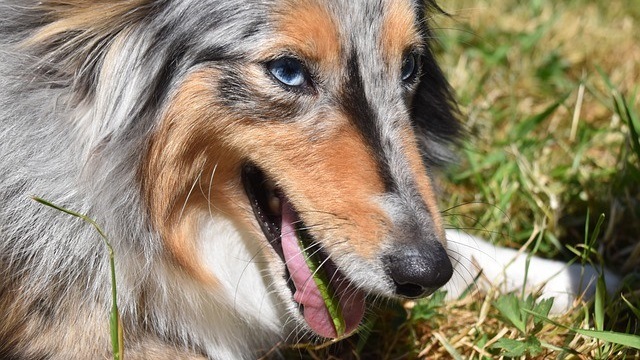
There are a few factors that have to be weighed if we want to better understand this behaviour. In some cases it might be difficult to identify the source of the problem, as these factors can overlap. If we are talking about a healthy dog or cat being fed a well-balanced diet, we should consider the following reasons to justify their grass-eating:
- The dog is outside but does not have much to do. When bored, nibbling grass might seem entertaining. Cats get bored as well and tend to eat the household plants.
- The dog is craving human interaction, and knows that if they start eating what they aren’t supposed to… Someone will eventually notice and give them attention. Wise pooches, these ones!
- Anxiety can incite odd behaviours that give the pet a sense of relief. This will help them cope with the stressful event. It is basically the same principle as when humans chew their nails.
- It can be a reflection of the dog’s natural scavenging behaviour or the cat’s natural instinct.
- They simply love it – a bit of crunchiness in one’s life is always welcomed.
Nutritional issues
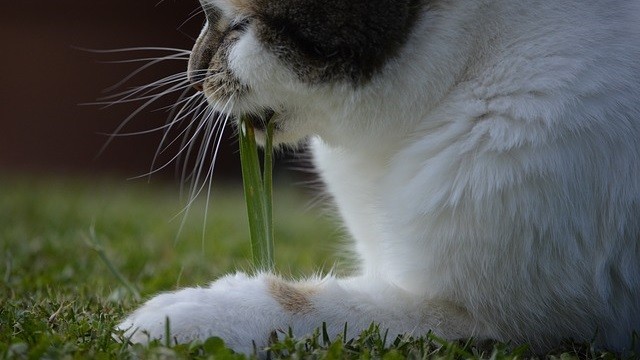
In addition, there is also the scenario where the pet’s nutritional requirements are not being met. In this case, they eat grass as a means to increase the amount of ingested roughage. Dietary fiber is essential for the intestinal tract to work properly! It allows food to be digested more efficiently and stool to pass through the bowls.
As mentioned before, it’s not likely that an imbalanced diet is the reason for this behaviour. The majority of our dogs and cats are fed commercial (and therefore well-balanced) diets, whether they are dry, wet or raw. Be aware that saying that a diet is well-balanced, does not mean it is high quality. It only assures that the nutritious requirements of the pet will be fulfilled. It tells you nothing about the sources, quality and how ingredients are processed.
We are now facing some new challenges, as the number of pet owners wanting to prepare their best friend’s meal at home is increasing. This raises some concerns on whether these home-made feeding plans meet all the nutritional requirements… That is why it’s mandatory to seek professional guidance, and there is no one better than a veterinary nutritionist to assist you. Maven’s Vet team is totally capable of assembling a high quality food plan tailored for your pet’s needs and lifestyle!
Detox plan: grass, grass and grass
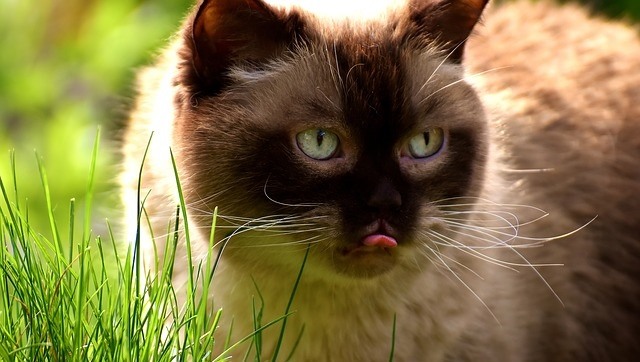
It’s common to assume that dogs and cats eat grass to clean their stomach… But in fact, there are no scientific studies that support this theory. Since less than 25% of dogs who eat grass end up vomiting, it would be surprising if they chose to eat their greens as a way to detox. And as astonishing as it may be, most of them are not even sick beforehand. Same applies to cats, and scientific research also corroborates this theory. Curious, right?
You may be wondering why people talk so much about this topic, then. Well, that’s because eating grass can lead to vomit and start a vicious cycle… In which the stomach gets overly sensitive every time the pet throws up, leading to even more vomiting. In these situations, our buddies might have a hard time finding something to eat that agrees with them, and relying on a bland diet is usually the only solution.
Can grass be a part of the dog’s diet?
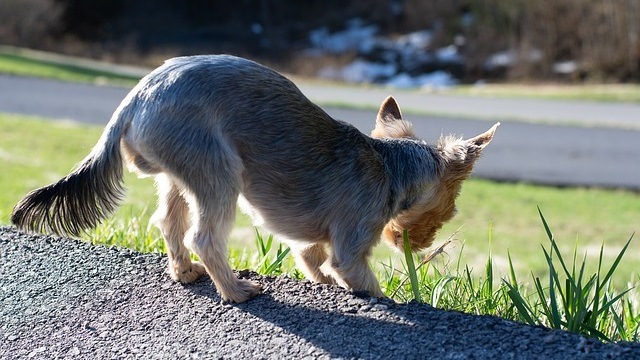
If it wasn’t for the chance of making the stomach upset, one could think that grass could be included in our pets’ diets without worry. Guess what? It should be avoided anyway, and the reason makes total sense. Public gardens and open fields are often treated with chemicals like pesticides, herbicides and fertilizers. When eating grass, our buddies are ingesting small amounts of these poisons too. In addition, they may also ingest intestinal parasites like hookworms and roundworms… Which may lead to vomiting and diarrhea if their deworming treatment isn’t up to date.
If the dog or cat is passionate about house plants, this can be problematic as well. There is a chance that even the tiniest bit of the plant is poisonous.
Grass no more!
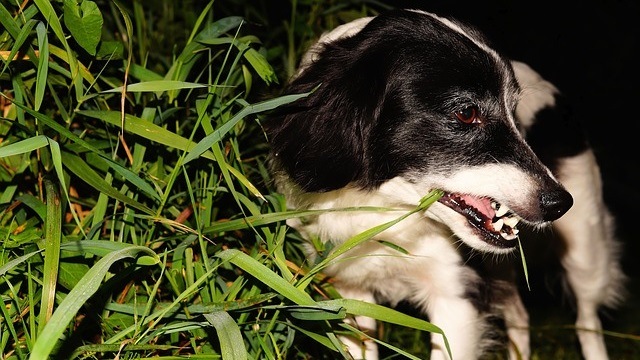
The first step is to figure out why the pet is grazing. Instead of “why do dogs eat grass”, you need to wonder “why is my dog eating grass?” Recall that more than one factor might be the source of the behaviour. As long as the nutritional balance of their meals is assured, you’ll only have to focus on the behaviour itself, and work on a desensitization and counterconditioning plan.
The trick lies in interrupting the dog or cat every time they engage in this task, just by asking them to perform another mission, such as a nice play or trick. Using positive reinforcement works beautifully, as usual.
If the source of the problem is related to boredom, then wasting the pet’s energy is a fairly good solution. For dogs, highly demanding physical activities like fetching and running will waste their batteries. Cats also need to release their energy, and for that, engaging in short but extremely intense play bouts does wonders. Mental stimulation is also powerful against boredom. Puzzle toys for both dogs and cats and nose exercises, especially for hunting dog breeds, are definitely good options to explore.
On the other hand, if the dog is clearly seeking attention, teach them that they can have it without having to eat grass. Once again, stopping the behaviour and redirecting it to a desired one will do the job. Perhaps they are just a bit more needy than usual, and some extra affection will not do any harm.
Conclusion
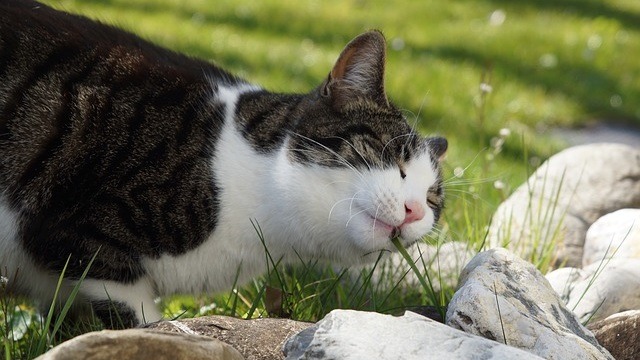
To sum up, what you should take from this is that allowing our beloved pets to eat grass is not a way of assuring they eat their greens. Those should come from the food we provide them, so be wise and keep a high standard – our body and soul are what we eat!
Maven is all about proactive pet care. Be your best friend’s best friend by giving them 24/7, high-quality, industry-leading vet care to improve their mental health, physical health and more. No more frantic googling or unneeded stressful visits to the vet – Maven helps you save hundreds while also ensuring your pet lives the best life possible. Get your kit now!

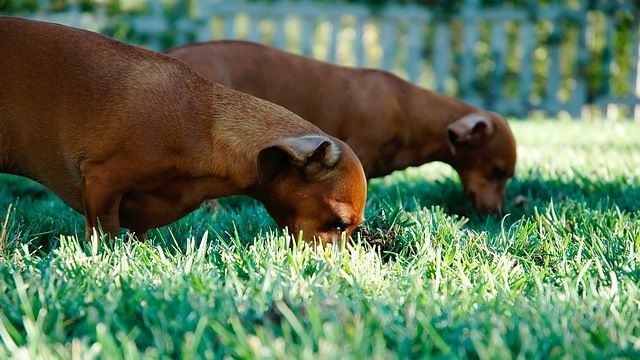



I had a Dingo for 14 years who occasionally would graze on her “select grass tips.” She was neither underfed or craving attention.
When she passed I got a little Chihuahua/Jack Russell Terrier with lots of energy who needs lots of exercise. She also seeks those same grass tips that my old dog liked so much. I always thought it was to add roughage. I never considered it a problem.
Hi Thomas, thank you for getting in touch and sharing your personal experience. As I’ve mentioned in the post, dogs can eat grass just because they enjoy their taste and crunchiness. It does not have to be related to an imbalanced diet or an attention-seeking behaviour. The majority of pups happen to nibble on grass without ever experiencing any problem at all. In Dingo and your current dog’s case, eating grass might be a way of getting some extra forage or a learned behavior that makes them feel good and relaxed, especially if they find the taste delightful! Going by what you’ve described, I’m definitely leaning more towards the second option.
I don’t fully concur with this analysis. ‘Grass’ is no ‘strange thing’ to eat. Of course, in some areas, there may be chemicals on grass. But also most commercial pet food includes lots of those (particularly if you don’t buy bio). If there is no vomiting problem, and if you are a responsible dog owner, giving your friend sufficient time and off leash exercise, there is absolutely nothing wrong eating grass IMHO. On the contrary, the fact that your dog chooses to do so (in most cases) shows that he or she is missing something and thus compensates – vitamins or fibres. My Kishu will not eat anything vegetable-like I serve him (tried pretty much anything), and acts exactly as the Dingo described by Thomas above (sometimes eating quite a bit of carefully selected leafs, incl. those of sunflowers). I am very convinced he knows what’s good and not good for him, and so I let him do his thing.
Hello Nick!
Thanks for your insight. It’s fair to say that we actually share overall the same opinion, which is, as long as it’s not causing any arm to our pets and they are properly dewormed, there’s no big issue with eating grass.
I could not agree more when you say that in some cases, dogs and cats choose to eat grass because they lack some nutrients. I’ve mentioned that in the article even if nowadays that’s not a major concern, considering the type of diet our pets are usually on. Once again, you’re totally right when saying that commercial foods might be packed with chemicals. Let me reiterate that a diet’s quality does not end on its nutritional balance but also includes the kind of ingredients, their quantities and source. I’m glad that you seem aware of that.
If Kishu doesn’t experience any trouble from eating grass and if he doesn’t fit in any of the reasons explained on the post that usually lead to this behaviour, I can only assume he simply finds grass to be tasty!